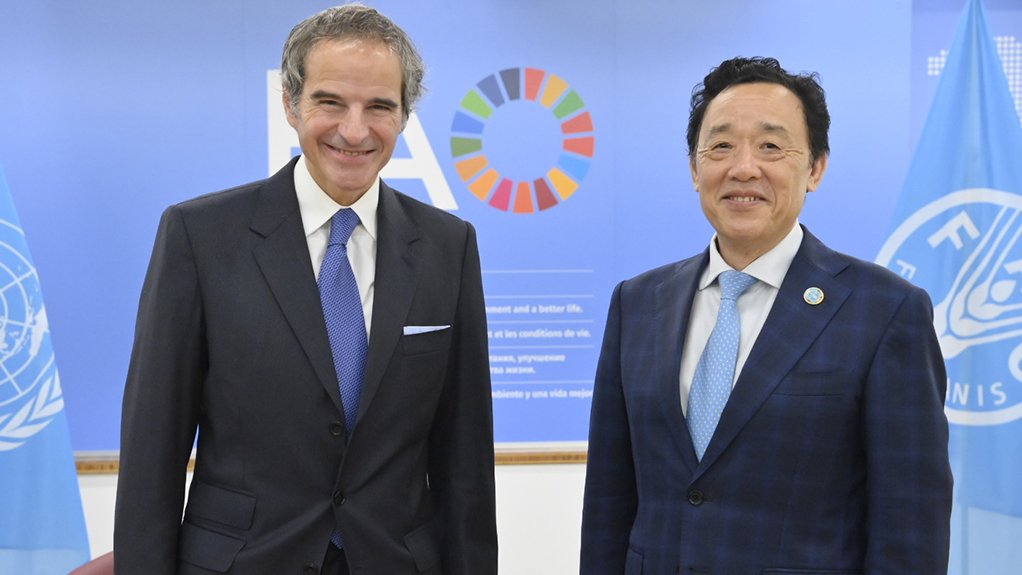Two major international agencies launch joint ‘Atoms4Food’ initiative
The International Atomic Energy Agency (IAEA) and the United Nations Food and Agriculture Organisation (FAO) launched, in Rome, in Italy, on Wednesday, their flagship Atoms4Food initiative. This will increase the use of nuclear technologies to strengthen global food security.
The IAEA and FAO have worked together for nearly 60 years to develop and use nuclear and isotope technology to increase food security, food safety and nutrition, and Atoms4Food builds on this experience. (The Joint FAO/IAEA Centre for Nuclear Techniques in Food and Agriculture started work in 1964.)
“We find ourselves in an unprecedented time, where hunger and malnutrition are on the rise, posing a threat to humanity,” affirmed the joint statement released by IAEA director-general Rafael Mariano Grossi and FAO director-general Qu Dongyu. “The Atoms4Food Initiative seeks to provide member States with ground-breaking solutions tailored to their specific needs and circumstances, by harnessing the advantages of nuclear techniques along with other advanced technologies.”
It was estimated that, last year, 691-million to 783-million people faced hunger and 3.1-billion could not afford a healthy diet. This amounted to more than 40% of the world’s population. It is now projected that in 2030 nearly 600-million people will be chronically undernourished. Yet, at the same time, all around the world, the incidence of obesity is increasing.
“Increasing climate extremes will cause more crops to fail, as global food demand rises,” highlighted Grossi. “We need to use every tool we have to grow more food. Nuclear science offers incredible, innovative tools to grow stronger, healthier, safer crops and to protect the food we need to live.”
Food security can be strengthened through various applications of nuclear technology. Nuclear and isotopic technologies can be used to diagnose and characterise disease pathogens in animals, and to use nutrient and water use in soil. They can accelerate plant mutation processes to more rapidly develop disease- and climate change-resistant crops. They can trace the sources of water contamination. They can be used to study various forms of malnutrition.
Further, the use of nuclear technology to sterilise pest insects targets specific species and reduces the need to use insecticides to protect animals and crops. And food irradiation ensures food is safe from pathogens, increasing shelf-life and strengthening food security.
Atoms4Food will provide member States with seven assessment services. These were: country-specific assessment missions; the Crop Variety Improvement Service; the Soil and Water Management and Crop Nutrition Service; the Animal Production and Health Service; the Insect Pest Control Service; the Food Safety and Control Service; and the Public Health Nutrition Service.
Article Enquiry
Email Article
Save Article
Feedback
To advertise email advertising@creamermedia.co.za or click here
Press Office
Announcements
What's On
Subscribe to improve your user experience...
Option 1 (equivalent of R125 a month):
Receive a weekly copy of Creamer Media's Engineering News & Mining Weekly magazine
(print copy for those in South Africa and e-magazine for those outside of South Africa)
Receive daily email newsletters
Access to full search results
Access archive of magazine back copies
Access to Projects in Progress
Access to ONE Research Report of your choice in PDF format
Option 2 (equivalent of R375 a month):
All benefits from Option 1
PLUS
Access to Creamer Media's Research Channel Africa for ALL Research Reports, in PDF format, on various industrial and mining sectors
including Electricity; Water; Energy Transition; Hydrogen; Roads, Rail and Ports; Coal; Gold; Platinum; Battery Metals; etc.
Already a subscriber?
Forgotten your password?
Receive weekly copy of Creamer Media's Engineering News & Mining Weekly magazine (print copy for those in South Africa and e-magazine for those outside of South Africa)
➕
Recieve daily email newsletters
➕
Access to full search results
➕
Access archive of magazine back copies
➕
Access to Projects in Progress
➕
Access to ONE Research Report of your choice in PDF format
RESEARCH CHANNEL AFRICA
R4500 (equivalent of R375 a month)
SUBSCRIBEAll benefits from Option 1
➕
Access to Creamer Media's Research Channel Africa for ALL Research Reports on various industrial and mining sectors, in PDF format, including on:
Electricity
➕
Water
➕
Energy Transition
➕
Hydrogen
➕
Roads, Rail and Ports
➕
Coal
➕
Gold
➕
Platinum
➕
Battery Metals
➕
etc.
Receive all benefits from Option 1 or Option 2 delivered to numerous people at your company
➕
Multiple User names and Passwords for simultaneous log-ins
➕
Intranet integration access to all in your organisation




















